On-demand content
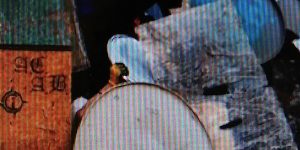
¿¿Women´s table??
The round table will be composed by women that are actively involved in Valdivia´s cultural production. Female artists, activists, academics and producers that will share views on the the current crisis, its latencies and consequences. The hinge of this conversation will be mutations and restrictions from a gender view, understanding that one of the mutations regards female participation within the cultural scenario.
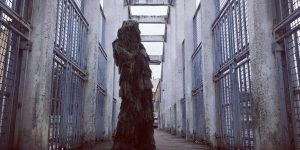
THE BAD WEEDS TRIPS
Rocio Berenguer (ES/FR)
In 2030, a human-plant hybrid guides us on a trip through the past, unveiling the origins of G5, the first inter-species political summit. The event was initiated by IOFLE, the Inter-species Organisation for The Future of Life on Earth. Its founders are thought to be the artist Rocío Berenguer and IA collaborator, IAGOTCHI.
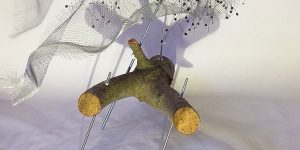
Mutations
The artistic proposal is presented as a curatorial articulation of multiple and heterogeneous work processes, but characterized by mutation. They are processes of works in mutation and on the mutation, like a seismograph of uncertainty. In their various formats, the works will be joined on the website of the UACh Réplica Gallery linked to the Ars Electronica Festival web platform.
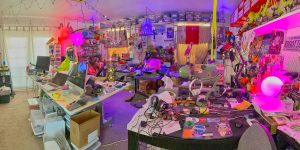
What Matters Now?
Sarah Petkus (US)
In the wake of the global COVID-19 pandemic, daily life has been disrupted and given room to change; from the comfort of routine to the energy that fuels the creation of electronic and robotic work.
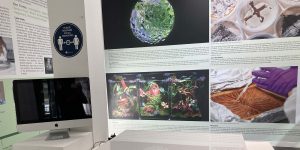
Identifying Successful STARTS Methodologies: Exhibition and Research Project
Pei-Ying Lin (TW), Giulia Tomasello (IT), Jen Keane (UK)
The exhibition presents the activities of the project, four of the eight case studies undertaken, and includes an installation of one of this years STARTS Prize 2020 Honorary Mention, Pei-Ying Lin’s Virophilia (2018-2020), an installation of Future Flora by designer Giulia Tomasello and winner of the STARTS Prize 2018 for Artistic Experimentation, alongside work from designer Jen Keane’s This is Grown project who received an Honorary Mention in 2019.
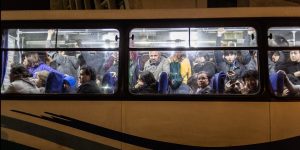
Mutations of the image. The revolt of photography
The first Valdivia International Festival of Photography, Directed by Carlos Fischer, was shaken by the revolt. The photographers changed their workshops on the streets. Lectures mutated. Images too. The abundant photographic material produced during those days in Valdivia, along with the video that reconstructs the convulsed days of the festival, make up an unexpected videogram of the revolt that can be viewed on the online platform of the Replica Gallery associated to UACh's Mutations project.
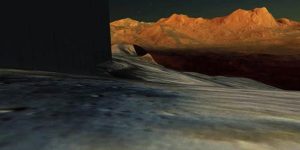
From Glass to Glass to Glass
Nye Thompson (UK)
For my new work /artefact, I took possession of a large area of Mars, using Google Earth and satellite survey data to build a supertall border wall around my claim.
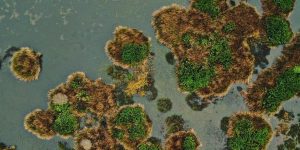
Ecosystem mutations. Wetland Removal.
An 8.5% of the surface area of Los Rios Region in southern Chile is made up of wetlands. Around the city of Valdivia, the presence of wetlands is particularly dense and some areas today are national monuments. A wetland is an ecosystem that is sometimes divided at the surface, but which constitutes a networked ecological continuum. Thus, to alter a part of the wetland is to modify the whole ecosystem. Promoting the convergence of different organizations, the Austral Garden program proposes an aerial route over the geography and natural environment where Universidad Austral de Chile is located. The purpose is that scientists and researchers can share their studies and reflections to spread the importance of wetlands, as well as showing the mutation of this natural eco-system.
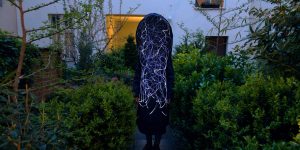
Artificial Intelligence and its False Lies
Mika Satomi (JP/AT)
In this tour, Mika walks you through her process of making Artificial Intelligence and its False Lies, from the first questions she had and how one led to the next, to interviewing scientists and finally teaching herself how to make an artificial neural network. She also attempts to explain how neural networks work, because she was shocked to learn there is no actual intelligence inside the black box!

Leonardo S+T+ARTS: A conversation on "What's next? Art-Science ideas emerging from lockdown."
Camille Baker (CA/UK), Danielle Siembieda (US), Aurelie Delater (FR) and Marie Albert (FR)
During lockdown, Leonardo and STARTS collaborated to exchange and reflect, together with their wider communities, on how COVID-19 is impacting Art-Science/Art-Technology innovation and co-creation.

Beyond Human Perception
María Castellanos & Alberto Valverde (ES)
The artwork is a video installation that allows the audience to visualize the reactions of humans and plants to a common stimulus: live music. The installation is the result of several sessions where the brain activity of humans was measured jointly with electrical oscillations in plants, using a sensor developed by the artists.
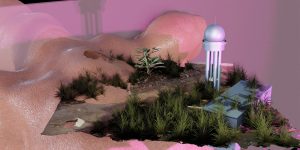
skip-the-line entrance
Daniel Hengst (DE)
Skip-the-line entrance, a collaborative guide to a speculative berlinDiscover a whole new Berlin. Join us on this journey and visit four local artists.
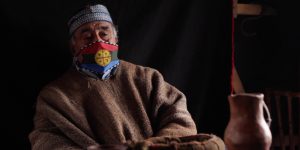
Local mutation imaginaries. Mapuche Culture Workshop.
As part of the celebration of the “Año Nuevo en el Sur” (Southern New Year), the Laboratory of Visual Anthropology of the Museological Direction, is conducting Workshops on Mapuche Culture taught by David Rain Canicura, peumatufe (the authority that guides the direction and decision-making of the community based on dreams) and nguillatufe (the authority responsible for the ceremony of Nguillatun). The proposal of the Mutations program is to generate a pre-recorded workshop that will allow the Mapuche imaginary about mutations to be better understood, as well as the experience of Mapuche communities in the current pandemic.
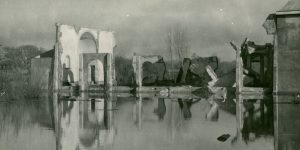
Telluric Mutations. The 1960 earthquake.
On May 22, 2020, 60 years since the largest seismic catastrophe ever recorded in the world was commemorated, a catastrophe whose epicenter was the city of Valdivia. The event had profound landscape, social, economic and cultural consequences for the affected cities and territories. The earthquake was a complex heritage where catastrophe and community resilience converge. The activity of the Austral Garden program is to share the series of initiatives prepared by the Museological Direction of Universidad Austral de Chile.
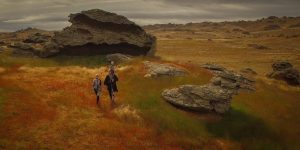
WAHAWAEWAO
Gibson / Martelli (UK), Carol Brown (NZ) and Russell Scoones (NZ)
Movement and landscape in flux, five figures wander across the landscape of Central Otago. Between the rocks and crevices, they move. In this moving image installation, we explore our persistent longing for belonging in an age of virtual travel. Filmed in the raw physical landscapes of Central Otago and the Motion Capture Studio of CoLab AUT in Auckland, we map between radically different scapes.

The Crying Book with Heather Christle and Performance by Gary Motley
Heather Christle, Gary Motley
The Crying Book is a deeply personal tribute to the fascinating strangeness of tears and the unexpected resilience of joy. Why do we cry? How do we cry? Heather Christle has just lost a dear friend to suicide and now must reckon with her own depression and the birth of her first child. As she faces her grief and impending parenthood, she decides to research the act of crying: what it is and why people do it. She researches tear-collecting devices and explores the role white women’s tears play in racist violence. Motley performs Someday Sunday as Christle reads from her first book of nonfiction, The Crying Book.
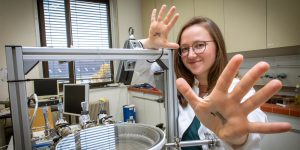
Reparatur der Zukunft
Ö1
With the Repairing the Future initiative, Ö1 wants to address the questions of 20 to 30-year-olds and give their ideas more space. Ars Electronica is presenting two projects around this theme

Pandemic-Pandemonium! Curated by Kennii Ekundayo
Galeri ODUMIJE, Lagos (NG)
Pandemic-Pandemonium! is a two-part presentation centered on the collective response of Africans living in Africa vis-à-vis current prevalent issues that threaten humankind — racial discrimination, violence against women and the COVID-19 pandemic. Whilst one part makes a statement on the resilience of the human spirit in the face of the deadly coronavirus, the other focuses on the valorization of melanin-rich skin amidst the fatal hostility that accompanies it.
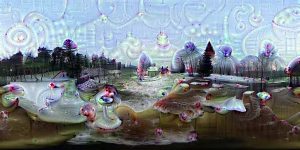
Keynote: Exploring Potentials and Risks of AI Technology from a Perspective of Creatives
Varvara Guljajeva (EE)
In the beginning of AI technology development in the late 50s, the field did not reach set goals because the machines were not smart and fast enough. Today, when it is spoken about the third wave of AI and quantum computing, the dream is very close to come true – reaching the human-level of intelligence. However, what kind of consequences could bring these technological achievements?
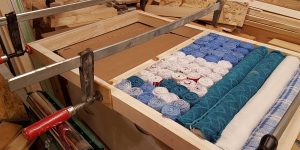
Master Class Audio Design Goes Interactive
Master Class Audio Design @ St. Pölten University of Applied Sciences (AT)
The Master Class Audio Design allows students to experience a wide range of audio designs. This is made possible by focusing on four projects which all students design, develop, plan, implement and evaluate independently over the course of four semesters. From this year's semester projects, three were selected to be presented at the Ars Electronica Festival.


